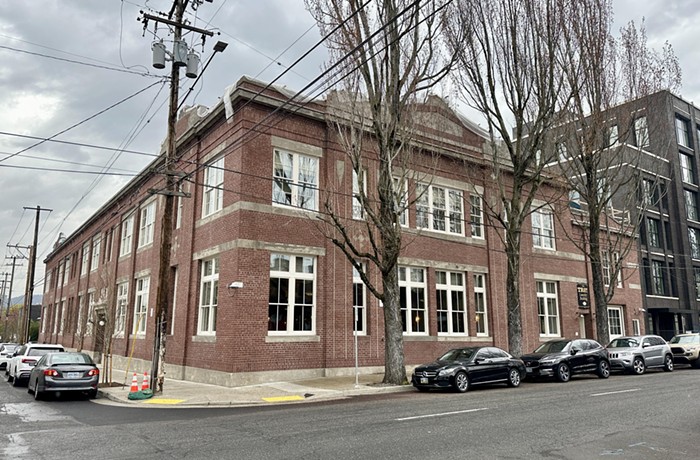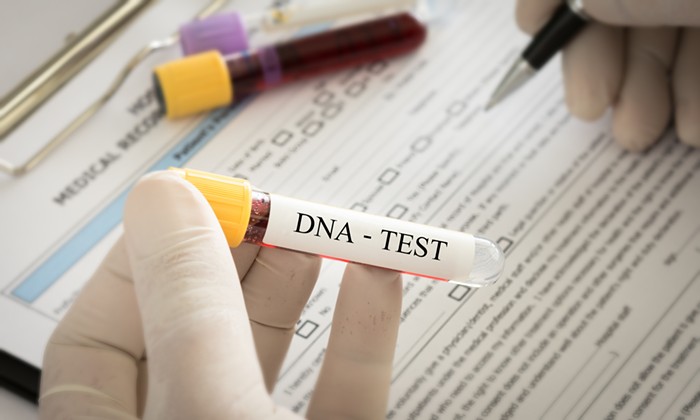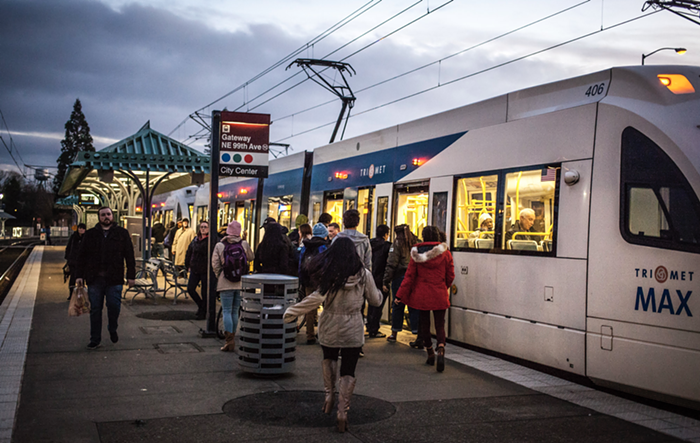
[In an effort to reflect on a very tumultuous year, the Mercury asked several Portlanders to look back on their 2020 and share how their lives have changed and what they've taken away from their experiences. Candace Avalos is a Blacktina, a former city council candidate, a PSU educator, and an activist for police reform, neighborhoods, and Black lives. Here is her 2020 story.—eds]
“It was supposed to be my year” is a phrase I've heard from so many people as they reflected on the plans they had for 2020—dreams and wishes that ultimately never came to fruition. I also entered this year thinking about all the goals I was going to crush, all the doors I was going to knock on during my first campaign for Portland City Council, all the places I wanted to visit—including a trip to see baby goats in Eastern Oregon. But that trip, like so many other plans, crumbled between my fingers during a year that truly tested everyone’s resolve.
The year started abruptly with a video call near midnight from my grandpa, who at the time was living in Guatemala. What I expected to be a routine "Happy New Year" wish quickly changed into the crushing revelation that my 81-year-old grandpa with lung cancer wasn’t going to live forever. The next day I booked a flight and was on my way to Guatemala for a week. Twelve hours of travel was spent reflecting on how I was going to recover from losing the man who defined so much of my life. As an early 30s millennial Blacktina—the daughter of Guatemalan immigrants who Grandpa brought across the border in the 1970s as well as African Americans who were born and raised in the Jim Crow South— the experiences of my multiracial family defined my American Dream.

I spent my week squeezing in as much quality time with my grandparents as I could during the day, and staying up late to work on my campaign. After many years of watching my communities suffer due to negligent and harmful leadership, I decided the manifestation of my American Dream would be to run for office and help usher in a new generation of young BIPOC voices in government. “2020 is going to be my year” I reminded myself every night before bed, determined to wake up each day and grind through what I knew was going to be the most challenging experience of my life.
Looking back on the days and weeks leading up to the first Stay at Home order, I can’t believe how oblivious we all were to what was coming. How could we have possibly prepared? On February 9, I launched my canvassing kickoff and was determined to spend the next few months knocking on as many doors as I could to earn the trust and votes of Portlanders. One chilly, sunny morning, while walking the streets of Northeast Portland, I met an older woman and had a conversation that changed me. Her hesitation in greeting me produced a pang of nervous energy, but it soon made sense when she expressed her fear for what I kept hearing on the news, but didn’t really yet understand.
“I’m worried about the coronavirus and how the government is going to respond,” she told me.
The fear in her voice shook me and I replayed it over and over in my head. I began to realize that I was facing an unprecedented campaign challenge that I knew would define the coming election.
Over the next few months, I watched in agony as people I cared about lost their jobs, income, healthcare, family members, and livelihood to a brutal global pandemic. And then my worst nightmare: the call I expected, but wasn’t prepared for. Like so many Americans who had to say goodbye to their loved ones from afar due to COVID-19, I said my final words to Emilio Avalos, the grandfather I’ve adored since I was born, on Facebook video chat. Rest in peace, King.
That was when the impact of our reality got personal. The combination of hesitancy, greed, incompetence, and negligence from government officials continues to take from us in deeply painful ways. I resumed campaigning with a renewed commitment to do right by the people around me as I navigated a complex new world. While sadly it wasn’t enough to win my primary election, I’m proud of coming in second place by promoting a message of transformative change to our institutions.

Less than a week later, as I continued to process the outcome of the election while considering the next steps of my political career, my purpose came back into harsh focus. Over a distressing eight minutes and 46 seconds, George Floyd was murdered before our eyes in broad daylight. The death of my grandpa fresh in my heart, I entered an entirely new feeling of grief. Breonna Taylor conjured a fear that was more personal. One painful side of me was grieving the patriarch of an immigrant family, while the other mourned the harsh reality that Black bodies in this country are seemingly disposable.
For three years I’ve been an active member, and now chair, of the Citizen Review Committee (a police accountability board for the Portland Police Bureau) which has been at the heart of the conversation on how we hold police accountable for the harm they cause to our communities. But this time was different. This time the country—already on edge after so many years of blatant harm, and now compounded by a global pandemic that was disproportionately ravaging Black and Brown families—had had enough.
I watched as thousands of Portlanders took to the streets to demand change. On June 5, I headed to Revolution Hall with my homemade “Anti-Blackness is Killing Us!” sign. After months of quarantining, the fresh air and human contact was almost too much to take in. Marching with thousands across the Hawthorne bridge in the name of Black Lives was for me the most invigorating experience of the year.

That feeling didn’t last long. For months after Portlanders began marching in the streets, every morning Twitter would be filled with endless video streams of the abusive, aggressive response by Portland Police. I felt all eyes upon me as the newly elected CRC chair. With a singular, once-in-a-generation opportunity to truly transform a powerful institution, I’m so grateful that the first Black woman ever to be elected to Portland City Council, Commissioner Jo Ann Hardesty, was on our side. When I got the call to join the effort to put together what eventually became Measure 26-217, I didn’t dare hesitate. I spent the next several months with a diverse coalition of change-makers working to ultimately pass the “Yes for Real Police Accountability” measure with an overwhelming 82 percent of the vote! The time for change was now.
Election night 2020 was a very confusing time, in which there were both major wins and upsets locally—but the one I cared about most was kicking our sin vergüenza president out of the White House. The wide range of responses from Americans on social media was expected, but despite it all, there was such a feeling of relief. However, a little over a week after the election, another example of our ever-present challenges showed up in my mailbox: a racist, threatening letter vowing to murder me and my close allies and friends in the racial justice movement.
When I entered the public eye as an outspoken Blacktina, I knew receiving death threats would be likely, but I still couldn’t prepare for the emotional toll it would take. The emotion that rose to the top was anger at the audacity of anyone daring to intimidate me for wanting to make my community better for everyone. It was yet another stark reminder that our problems started way before Donald Trump, and they will certainly continue.
Despite everything we endured together, 2020 was our year. It was our year to confront our past and change our future. It was our year to reconnect with our human instincts and to love our neighbor. It was our year to amplify voices of the oppressed and make a commitment to dismantle white supremacy. It was our year to demand our basic American rights to life, liberty, and pursuit of happiness; but this time making it truly for all of us.

As I look at my phone’s screen saver—a smiling picture of my grandpa holding a hot cup of atole de elote in Guatemala—I’m giving myself permission to exhale. That’s what Grandpa would have wanted. He always used to tell me, “Nena, this world can take everything from you, but the one thing it can’t take is what’s in your head and in your heart.” This year felt like it took a lot from me, but it also replenished me with knowledge, empathy, and a reminder that radical self-care is a necessary tool in the continued fight for justice.
The challenges in front of us feel overwhelming, but what gives me hope for our future is the way we came together in big and small ways to grow and change amid so much chaos. Whether it was showing up to a protest, sending a letter to an elected official demanding change, or simply having a conversation with a neighbor about why Black Lives Matter, I watched my community make a commitment to be better. We will continue to make mistakes, but the effort to learn matters—and that’s what I’m taking away most from this hellish year. So cheers to 2020: Let us apply the lessons we learned so we can do better in 2021 and beyond.
With Love,
Your Neighborhood Blacktina



















